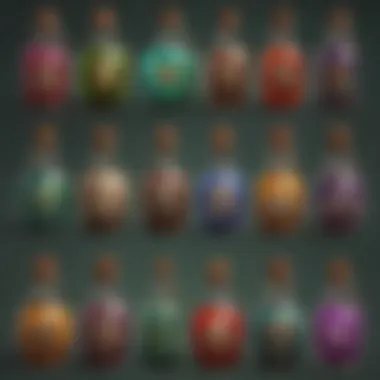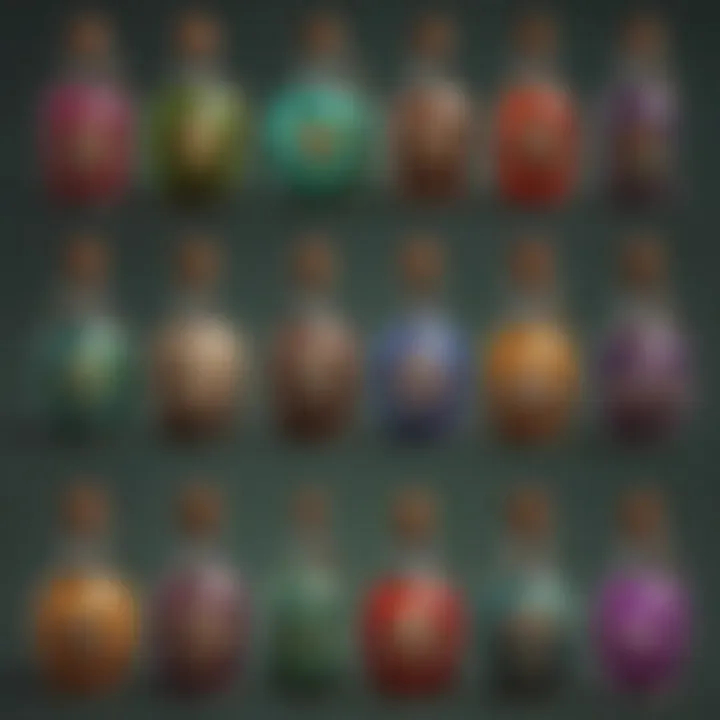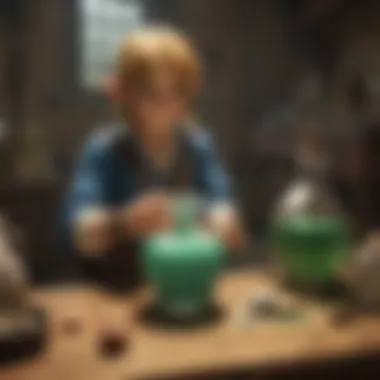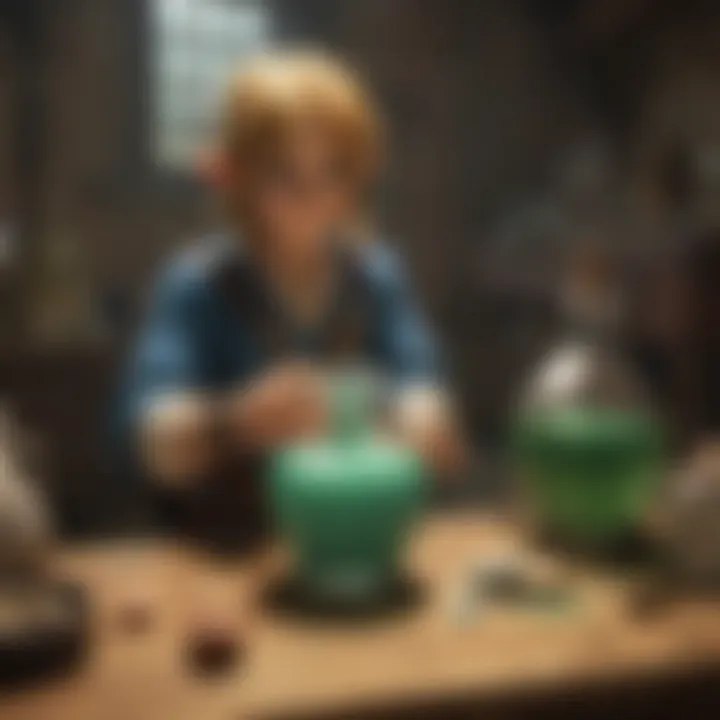Exploring the Magic Potions of the Zelda Universe


Intro
Magic potions in the Zelda universe serve as more than mere consumables; they represent a rich tapestry of lore and gameplay mechanics deeply embedded within the franchise. From the fragrant brews in Kakariko Village to the elixirs that can be found in the most obscure corners of Hyrule, these potions enhance not only the player's abilities but also the narrative experience. Each potion has its own story, providing insight into the cultures and traditions of the various races inhabiting this fantastical world.
As players progress through their epic quests, potions take center stage during crucial moments, often determining the outcome of intense battles or intricate puzzles. In this exploration, we’ll delve into the origins and effects of these mystical mixtures, showcasing how they shape gameplay and character interactions throughout the saga.
Game Reviews
Gameplay Features and Mechanics
The Zelda series has long been revered for its intricate gameplay mechanics, and potions play a vital role in this balance. Players gradually learn about the characteristics of each potion, which range from health restoration to stat boosts. The use of potions is not only strategic but often necessary to overcome the numerous obstacles presented throughout the games.
For instance, in "The Legend of Zelda: Ocarina of Time," players can utilize potions to replenish health or enhance abilities like strength and agility. This dual functionality encourages deeper engagement with the game mechanics, urging players to creatively integrate potions into their play style.
Storyline and Quests
As players navigate through the rich story arcs of the Zelda series, potions often align themselves closely with major quests. They can be found through various means: purchased from shopkeepers, brewed in specific locations, or gifted by characters entwined in the lore.
A notable example is the quest involving the fishing pond where Link can exchange fish for potions in "Link’s Awakening". This underscores how potions can be both a reward and a tool in advancing the storyline, blending character interactions and quests seamlessly.
Visuals and Sound Design
One cannot overlook the visual and auditory elements that accompany potions. Each concoction looks unique, often represented by colorful vials and shimmering effects that entice players. The sound design also enhances this experience; the soft clinking of potion bottles or the ambient sounds of bubbling potions evoke the magical atmosphere of Hyrule’s various realms.
Comparison with Previous Titles
When comparing potions across different Zelda titles, one might notice the evolution in their utility and presentation. Earlier games, like "The Legend of Zelda: A Link to the Past," offered more simplistic potion mechanics, primarily about health restoration. However, as the franchise expanded, potions became crucial for strategic gameplay, requiring players to think ahead and consider the timing and application in battles or puzzles.
Character Analyses
Popular Characters Overview
Among the most iconic characters in the Zelda series, we find potent potion masters such as the Fairy Fountain guardian and the enigmatic shopkeepers scattered throughout Hyrule. Characters like these serve as pivotal sources of knowledge and resource management, guiding players toward the right decisions in potion usage.
Character Development and Backstories
The backstories of these potion experts often weave themselves into the narrative of the games. For instance, the Great Fairy has a rich history and emotional ties to Link’s quests, revealing much about the feminine power within Hyrule.
Role in the Zelda Universe
Potions underscore the interconnectivity of characters within the Zelda universe. They allow players to forge bonds with NPCs, often leading to deeper lore exploration and friendships formed through shared quests. Characters who provide potions often have unique dialogues revealing their histories, which enriches the overall game experience.
Fan Theories and Speculations
Fans have speculated wildly about the origins of certain potions, suggesting ties to real-world folklore and magic practices. These theories further illustrate how potions transcend mere gameplay elements to echo cultural significance, inviting discussions in various online communities like reddit.com.
Lore Discussions
Mythology and Worldbuilding
The lore of Zelda is filled with mythos, where potions frequently appear as artifacts of ancient knowledge. Each potion can reflect the characteristics of the land or the spirits connected to its creation, enriching the world of Hyrule.
Legendary Items and Artifacts
Items like the Elixir of Life or the magical potions closely related to Zelda's Triforce mythology serve as substantial plots in the narratives. They highlight the balance of power, wisdom, and courage deeply embedded in the series.
Link to Real-world Mythologies
Several potions awaken echoes of real-world traditions. For example, the concept of healing potions in the series can be traced to herbal remedies found within various cultures, thereby giving a sense of familiarity to gamers.
Timeline Placement and Theories
Where potions fall within the overall timeline of Zelda creates fertile ground for theories. Players often attempt to place the origin of certain potions within the lore timeline, contemplating their impact on the history of Hyrule.
Gameplay Strategies
Combat Techniques and Tips


Effective use of potions can be the deciding factor in a combat scenario. Players often devise strategies around potion usage to gain the upper hand against formidable foes. Whether it’s gaining temporary invulnerability or boosting attack damage, planning out potion use can make challenging encounters manageable.
Puzzle Solutions and Walkthroughs
Potions frequently hold the key to solving certain puzzles. In various dungeons, players need specific potions to unlock secrets or reveal hidden paths. The ability to think critically and remember potion effects becomes crucial in these scenarios.
Collectibles and Side Quest Guides
Beyond main quests, many side activities revolve around exploring potion-related challenges. The thrill of collecting the rarest potions often leads players on memorable journeys, yielding both rewards and illuminating character stories.
Boss Battles Tactics and Strategies
When facing off against bosses, the strategic use of potions can turn the tide. Players become adept at timing their potion consumption to counteract bosses’ moves or minimize damage taken. Mastering this aspect of gameplay is a rite of passage for many seasoned Zelda fans.
"Potions are not just tools; they are stories waiting to unfold in every sip."
Intro to Magic Potions
Magic potions play a pivotal role in the intricately woven tapestry of the Zelda universe, serving not only as tools of gameplay but also as symbols of the mystical essence that defines this beloved franchise. This section will explore why the concept of magic potions is significant to fans, how they enhance the storytelling, and the mechanics in which they operate.
Defining Magic Potions
At its core, a magic potion can be defined as a concoction that grants various effects when consumed, be it restorative, enhancing, or otherwise. In the context of Zelda, these potions serve multiple purposes and come in a range of flavors, so to speak. From health restoratives that mend Link's injuries to stamina elixirs that allow him to climb the highest peaks, the diversity of potions reflects the ingenuity of the game's design.
For example, the classic Red Potion traditionally restores health, while the Green Potion might grant additional magical power. Each potion not only aids in gameplay but also invites players to immerse themselves into a world where magic is both wondrous and pragmatic. The intimate relationship between Link and these potions illustrates the interdependence of hero and magic, shaping an aspect of gameplay where strategic thinking is as crucial as skill.
The Cultural Significance of Potions
In many cultures, potions are often linked with folklore, myth, and even alchemy. This narrative carries through in Zelda, where potions embody the fusion of art, necessity, and adventure. They contribute to the lore, adding intriguing layers to the story—a perfect blend of culture and escapism. Fans have long held onto the ideas behind these brews, drawing parallels between the potions in Zelda and similar artifacts in various mythologies.
Potions serve not just a mechanical purpose but cultivate a deeper connection with the game's world. For instance, the Fairy Fountain, a sacred site in the Zelda universe, symbolizes the restorative powers of magic. When players use a potion derived from such a place, it enriches their appreciation of the game’s world and its lore.
"In Zelda, potions are not just items; they're gateways to lore and exploration, bridging the physical and the mystical."
Moreover, the very act of potion crafting can evoke community and creativity among players. Sharing recipes on forums like reddit.com or discussing strategies on facebook.com creates a communal understanding, fueling discussions that broaden the cultural impact of these enchanting brews.
In summary, this exploration of magic potions serves to elevate the conversation about gameplay mechanics into a discussion about cultural narratives and the connections they foster in the gaming community.
Historical Context of Potions in Zelda
Magic potions in the Zelda universe are anything but mere footnotes; they have roots tangled deeply in the lore and mechanics of the games. Understanding the historical context of these potions offers insights into their evolution, significance, and integrative role within the gameplay. This historical exploration reveals how potions have transformed not only as gameplay elements but also as narrative devices, highlighting a fascinating interplay between lore and mechanics.
Early Appearances in the Series
The journey of magic potions in the Zelda franchise began back in The Legend of Zelda (1986). At this juncture, potions were basic yet pivotal for survival. For players who had to navigate the perilous terrains of Hyrule, potions were a lifeline, replenishing hearts lost in battling enemies. The red potion restored health, while the blue potion offered a refreshing boost to magic energy. These early introductions were devoid of elaborate backstories or crafting mechanics but were tinged with mystery that hinted at a greater legacy.
Fast forward to The Legend of Zelda: Link's Awakening, released in 1993, where potions began to weave themselves into the game's narrative fabric. Players not only obtained potions from local merchants but also interacted with characters who provided hints or backstory concerning their origins. This subtle shift laid the groundwork for future iterations of potion mechanics, intertwining the gameplay with the world-building of Hyrule.
Evolution of Potion Mechanics
The evolution of potion mechanics in Zelda is akin to watching a plant bloom. From mere health replenishments to complex concoctions, potions have grown to embody various strategic layers. The Legend of Zelda: Ocarina of Time, released in 1998, marked a significant turning point. For the first time, potions could be used in conjunction with specific items and combat scenarios. Health-restoring potions now had counterparts that enhanced stamina or boosted offense. These innovations breathed new life into combat systems and added depth to exploration.
As the franchise continued to evolve, The Legend of Zelda: Breath of the Wild showcased another leap forward, particularly in potion crafting. Players could collect ingredients around Hyrule and mix them to concoct potions tailored to their needs. This flexibility in potion creation added layers of strategy to gameplay. One might experiment with various mixes, such as combining Hyrule herbs with Monster Extract, to get unexpected results. Here, the lore met the mechanics; each ingredient had its backstory tied to the world of Zelda, making every potion feel like an extension of the player’s journey.
In summary, the historical context of potions in the Zelda series lays a foundational understanding that merges narrative with gameplay. As potions evolved, they not only expanded the mechanics of the games but also enriched the player's connection to Hyrule, revealing that these elixirs are more than simple items—they are keys to unlocking the magic of the franchise.
"The history of potions in Zelda is a testament to how gameplay can intertwine with story, elevating both to a level of art form."
Understanding this rich backdrop enables players, new and seasoned alike, to appreciate the allure and charm that magic potions bring to the enchanting world of Zelda.
Types of Magic Potions
Health Restoratives
Health restorative potions are among the most familiar and essential types in Zelda. As players progress through various dungeons and face formidable foes, these potions serve as lifelines. They can replenish Link's health gauge, allowing him to push forward in often desperate situations. Notably, these potions bring to mind practical strategies within gameplay. For example, during boss fights, utilizing a health potion at a critical moment can turn the tide, injecting a rush of adrenaline and strategy into encounters.
In older titles, such as The Legend of Zelda: Ocarina of Time, finding a red potion can be a core strategy in planning for a challenging dungeon. The ability to restore health brings a layer of depth to the player’s choices and adds a sense of urgency — you can't afford to be careless.
Stamina Elixirs


Moving away from sheer health restoration, stamina elixirs play a vital role in expanding Link's capabilities. These potions are crucial for lengthy climbing sessions, sprinting through perilous fields, or engaging in intense combat sequences requiring rapid movement. The stamina mechanics differentiate Zelda from other adventure titles. Players often find themselves contemplating when to use a stamina elixir to ensure safe navigation through treacherous environments.
For instance, using a stamina elixir can be pivotal in the climbing sequences in Breath of the Wild, where players must reach high cliff faces. Without these potions, Link’s journey is severely hampered, making them a necessity rather than just an option. The pressure that comes with resource management — whether to hoard them or use them strategically — amplifies engagement with the game world.
Combat Enhancers
Combat enhancers take potion crafting a step further, emphasizing not just survival, but dominance in battle. Potions that increase attack power or defense can shift the dynamics of a fight instantly. They motivate players to experiment and strategize. When venturing into combat-heavy areas, choosing to stock up on attack-lifting potions may enhance your effectiveness against tougher foes.
These potions don't just amplify Link's abilities; they evoke tactical planning. When players know they can boost their damage output for short bursts, the pacing of combat shifts dramatically. Especially in challenging scenarios, these potions breathe fresh life into fight strategies and decisions.
Specialty Potions
Lastly, we can't overlook specialty potions. These concoctions often add unique effects, like temporary invisibility or elemental resistance. They stand apart because they encourage creativity in problem-solving. For instance, using a potion that grants fire resistance can make the difference between life and death when navigating lava-filled areas. Furthermore, interactions with NPCs or environmental puzzles may hinge on these unique effects.
Specialty potions can also reflect a broader narrative theme, showcasing Zelda's ability to weave complexity into its gameplay. Incorporating these thrilling mechanics allows for unexpected detours in quests, enlivening the overall gaming experience.
In summary, understanding the types of magic potions significantly enhances one's appreciation of the Zelda universe. Each potion serves its own role, and together they paint a picture of strategic gameplay.
"In the world of Zelda, every potion has a purpose. They are not mere items; they are keys that unlock the potential within every adventure."
In the end, it's not just about survival; it’s about how well intrepid players can navigate through various encounters using the right potion at the right time.
Crafting Potions in Zelda Games
Crafting potions stands as a cornerstone in the Zelda universe, providing players not only with tools for survival but also enriching the overall gaming experience. The act of potion crafting is layered with intention, strategy, and a hint of creativity. By engaging with this mechanic, players can customize their approach to challenges within the game, enhancing their personal gameplay and molding their character to suit their strategy.
Ingredients and Recipes
At the heart of potion crafting lie the ingredients. These are often found scattered across the lush landscapes of Hyrule, each located in diverse and sometimes treacherous environments. For instance, one might need to hunt for the elusive Sunshroom and combine it with Mighty Bananas for a health-boosting potion. It’s not just about gathering what is available; understanding the synergy between ingredients is crucial.
- Collecting ingredients can feel like a mini-adventure of its own. Players might find an unexpected surprise when mixing ingredients, turning their attempts into a delightful discovery.
- Recipes can differ across games, with some featuring rare and unique potions. For example, Hylian Rice combined with Fresh Milk can yield a heart-replenishing dish in certain titles, demonstrating how crafting transcends mere potion-making and enters the realm of cooking.
- The need for trial and error enhances replay value; players might spend countless hours experimenting with different mixtures, adding layers of depth to their journey.
The Role of Alchemy
Alchemy in the Zelda series is often viewed as a form of magic, wielded by those who dare to delve into the arcane arts of potion-making. Unlike other mechanics that are straightforward, alchemy requires thought and experimentation. Within this intricate world, players must consider not just the result but the process itself.
"Alchemy turns the mundane into the marvelous, inviting players to blend creativity with strategy."
- Transformational Process: Alchemy allows players to convert basic materials into something far more potent. This transformation can be symbolic of the character’s growth throughout the game, where basic ingredients reflect the humble beginnings of their adventure.
- Environmental Interactions: Ingredients are often impacted by their environment. For example, a potion crafted with rain-soaked plants might produce a different effect compared to those crafted in dry, sunny areas. This adds a layer of realism that immerses players deeper into the world of Zelda.
- Cultural Ties: The process of alchemy echoes the historical fascination with potion-making in various cultures across the globe. Zelda games tap into this, allowing players to experience a slice of that mystique firsthand, encouraging them to reflect on how potions and their crafting shape narrative arcs and character development.
Overall, the crafting of potions in Zelda is not merely a gameplay mechanic; it embodies the very essence of exploration and experimentation, inviting players to develop their skills through each unique encounter in the sprawling landscape of Hyrule.
Potions as Gameplay Mechanics
In the realm of gaming, particularly in The Legend of Zelda series, potions serve as more than mere items in Link's inventory. They are integral components that shape gameplay experiences. Without delving into the mechanics of potions, the player would miss a crucial layer that enhances both strategy and immersion within Hyrule. Effectively managing potions can mean the difference between life and death in battles, as well as a means to traverse challenging landscapes and solve intricate puzzles.
Strategic Uses in Combat
Combat is often where the magic of potions truly shines. Each type of potion offers unique advantages that can significantly tip the scales during encounters:
- Health Restoratives: These potions allow players to replenish health mid-battle. For instance, in Breath of the Wild, consuming a Health Potion right before a boss's devastating attack can turn the tide, enabling players to engage in more aggressive tactics without the constant worry of defeat.
- Combat Enhancers: Potions like the mighty Mighty Elixir grant temporary boosts to attack power. Picture this: you’re facing a Lynel, one of the toughest foes in the game. With a timely Mighty Elixir consumed, your strikes hit harder, making the fight not only feasible but also exhilarating. Timing the consumption of these potions can lead to an unforgettable victory.
- Speed Potions: When Link needs to evade an enemy’s onslaught or reposition for a strategic advantage, Speed Potions can make all the difference. Moving at double or triple speed allows for agility that can evade even the most aggressive attack patterns.
It’s essential to recognize that the strategic use of potions is not solely about firepower. The understanding of when to consume a potion can create a tactical advantage that enhances combat dynamics, turning fights into masterful ballet rather than mere button-mashing.
Exploration and Puzzle Solving
Zelda's landscapes are rich, filled with secrets, and often, players encounter puzzles that require more than just keen eyes. Potions play a pivotal role in unlocking the mysteries behind these situations:
- Stamina Elixirs: For those punishing climbs up mountains or long swimming treks, maintaining stamina is key. An elixir that boosts stamina can mean the difference between reaching that hidden shrine or falling short and returning to the ground below.
- Elemental Potions: In areas affected by extreme heat or cold, drinking a potion to raise Link's resistance opens pathways previously deemed inaccessible. Imagine trying to traverse a snow-covered mountain without that heat-resistant potion; the obstacles would become insurmountable.
- Puzzle Mechanisms: Some puzzles require players to interact physically with their environment, often in hazardous locations. A potion that grants Link temporary invincibility or immunity can encourage exploration without the constant threat of instant death.
By creatively using magic potions, players navigate challenges that would otherwise result in frustration, thus enhancing the overall experience of The Legend of Zelda games.
Ultimately, potions in Zelda are not mere accessories; they are mechanisms for immersive gameplay. They blend seamlessly into the narrative and practical elements of the games, allowing players to forge their paths through Hyrule’s complexities.
Notable Potions and Their Impact
In the expansive universe of Zelda, magic potions do more than just restore health or enhance abilities; they fundamentally shape the gameplay experience and narrative arcs. These potions not only have a place in the inventory but serve as pivotal tools that influence strategic decisions, challenging the player in unique ways.
Every potion holds significance, often tied to the lore of Hyrule and its characters. When analyzing the impact of notable potions, one can discern a pattern where they become keys to overcoming obstacles, solving puzzles, and, in some cases, even deciding the fate of characters within the storyline.


"Magic potions breathe life into gameplay, giving players a tactical edge while steering narrative outcomes."
Potions That Changed the Course of Gameplay
Throughout the Zelda series, certain potions stand out because of their transformative effects on gameplay. For example, the Red Potion, a staple in many titles, doesn’t just fill hearts; it offers strategic advantages in the heat of battle. In "The Legend of Zelda: Ocarina of Time," players often rely on this potion during intense confrontations with powerful foes. The quick restoration of health can be the difference between triumph and failure.
Another game-changer is the Double Defense Potion found in "The Legend of Zelda: Majora's Mask," which temporarily doubles the player's defense. Using this potion can turn the tide against challenging bosses or overwhelming hordes. It promotes the idea of resource management, urging players to think critically about when to deploy their potions for maximum effectiveness.
In contrast, the Goddess Potion from "The Legend of Zelda: Breath of the Wild" feels almost mythical, enhancing both attack damage and defense for a limited time. This creates intense moments of strategic planning, as players must decide when to buff themselves for particularly demanding encounters or before exploring unknown territories.
Character-Centric Potions
Character-centric potions not only affect gameplay but also foster deeper connections with the characters themselves. The Potion of Restoration, for example, connects directly to Link's journey. It's not merely about survival; it embodies the bond Link has with the mysteries of Hyrule. In "The Legend of Zelda: Twilight Princess," the Critter Potion is linked closely to the character of Agatha, a whimsical figure who adores bugs. It insists that while potions can challenge gameplay, they can also reflect the personalities of those around them.
Moreover, potions like the Fairy Potion have a significant tie to the beloved fairy companions, bringing a nostalgic warmth. Players often remember vendor characters, noses buried in ingredients, roaming the quaint shops, tirelessly working to refine their brews. This injects a personal touch into what might otherwise be just another inventory item.
In summary, notable potions in the Zelda universe stand as pivotal elements that enrich gameplay and character narratives. They provide not just functional boosts but also emotional connections, urging players to engage with the enchanting world that is Hyrule on various levels. As the series continues to evolve, the role of these potions will remain vital in shaping the journeys of both old and new players alike.
The Lore Behind Magic Potions
Magic potions in the Zelda universe are not just mere items to replenish health or enhance abilities; they weave a rich tapestry that connects gameplay, narrative, and lore. These potions often embody deeper meanings and reflect the myths and stories that inspire their creation. The allure of these brews lies in their capacity to encapsulate the essence of adventure, magic, and transformation throughout the series. Understanding the lore behind these potions sheds light on their significance in both gameplay mechanics and the overarching narratives of the games.
Mythical Inspirations
The inspiration behind the potions found in the Zelda universe can be traced back to various mythologies and folklore. Many of these tales emphasize the magical properties of certain herbs and concoctions. For instance, the practice of using plants like Mandrake or Belladonna in traditional remedies speaks to the age-old belief in the healing powers of nature.
In Zelda, taking a page from these ancient tales, the potions serve as more than just in-game items; they become vessels that carry the weight of history. For example, the iconic red potion, traditionally associated with recovery, might hark back to potions described in European folklore, used by witches and herbalists. Such connections not only enhance the game's immersive experience but also reinforce the sense of wonder surrounding the Zelda universe.
Moreover, some potions evoke images from Eastern mythology, where alchemy and transformation are central themes. The use of mystical elements in potion crafting resembles the legendary elixirs that grant wisdom or longevity, which are staples in tales from cultures worldwide. By drawing on these mythical inspirations, Zelda creates layers of meaning that resonate with fans, linking their gameplay experience to timeless stories.
Potions in Zelda Narratives
Within the narratives of Zelda, potions often serve as more than simple gameplay mechanics; they embody pivotal moments that reflect character development and story progression. They act as plot devices that can alter the course of events, akin to how a well-crafted spell can change fate. In several games, the protagonist, Link, relies on potions during critical junctures, revealing their importance in his journey.
A telling example lies in The Legend of Zelda: Breath of the Wild, where potions vary in effects based on ingredients, closely tying them to land and culture. The use of local herbs and critters connects players to the environment, emphasizing how nature impacts the adventure. Players aren't merely brewing potions; they engage with the lore in which these ingredients thrive.
"In the world of Zelda, every potion crafted is a step deeper into the story, reflecting choices, consequences, and the beauty of exploration."
Additionally, the rare potions that grant temporary abilities usually tie back to specific challenges faced throughout the games. They are woven into quests, often requiring players to seek out rare materials or complete side missions. This setup ensures that potions elevate gameplay while enriching the storyline, deepening immersion for the player.
The enchanting world of magic potions in Zelda serves to blend the intricacies of lore with gameplay, making them integral to understanding not just the mechanics, but the essence of the Zelda experience itself. Through mythological influences and narrative significance, potions become symbols of exploration, growth, and the magic that permeates every corner of this beloved universe.
The Future of Magic Potions in Zelda
The ongoing legacy of magic potions in the Zelda series hinges on how their role continues to evolve in future installments. As part of an ever-expanding universe, these potions are not just mystical items but pivotal elements that enhance gameplay, narrative depth, and player engagement. Players have long enjoyed experimenting with various concoctions, unraveling their effects and benefits. With each new game, there lies a treasure trove of potential waiting to be tapped into.
Potential Innovations
Future games within the Zelda franchise have a compelling opportunity to innovate the use of potions. One potential direction might be to integrate dynamic crafting systems that allow players to combine different base ingredients to create unique brews. Imagine a scenario where players can mix a fire-based herb with water elements to craft a Hydro Flame Potion, granting them the ability to travel through lava or extinguish fires during quests. This interplay between exploration and potion-making could unveil new strategies and deepen player engagement.
Moreover, the introduction of temporary environmental effects based on potions can enhance immersion. Picture consuming a potion that changes the colors of the landscape or alters the weather conditions temporarily. Such innovations would not only add an aesthetic layer but could also influence gameplay mechanics, creating a richer tapestry for game designers to weave their stories.
The concept of potions granting lasting abilities could also be explored further. For example, what if certain elixirs could impart a permanent boost to abilities, like an increase in stamina or reduced damage from enemies? The implications for gameplay would be significant as players strategize about when to use these transformative potions versus temporary buffs.
Anticipating Fan Reactions
Anticipating how fans will react to any new potion mechanics is a balancing act that developers must navigate carefully. Zelda enthusiasts have a deep-rooted attachment to the series’ traditions, but they also crave innovations that push boundaries. As the games evolve, there needs to be a keen understanding of fan feedback. It can prove beneficial to experiment in localized gameplay, perhaps in spin-offs or smaller titles before rolling out new mechanics in mainline games.
Feedback from communities on platforms like Reddit can serve as invaluable insight into what potions players favor or wish to see. Incorporating community suggestions into potion mechanics, or even hosting polls to gauge interest in specific innovations, can foster a sense of investment among fans. Also, merging traditional potions with new concepts has a chance to introduce a broader audience to the franchise.
Ultimately, the allure of potions in the Zelda universe is closely linked to their ability to surprise and engage players. By blending established elements with bold new ideas, developers can craft a future where magic potions remain a cornerstone of the experience, keeping it as enchanting as ever.
Ending
The Enduring Appeal of Potions
Magic potions resonate with players for various reasons. First and foremost, they embody a sense of mystery and possibility. Who hasn’t felt that thrill when discovering a new potion for the first time? The visual representation of potions adds a layer of intrigue, often illuminated by vibrant colors and distinctive bottles, capturing the essence of their effects.
Also, the types of potions available often allow for strategic variations in how players approach challenges. A health restorative might be the difference between life and death in a heated battle, while a stamina elixir enables exploration over treacherous terrains – it’s a delicate balance of risk and reward.
"Potions in Zelda do more than heal or empower. They connect us to the lore, each sip echoing tales from Hyrule’s past."
Moreover, magic potions serve as a bridge between gameplay mechanics and character development. They enhance Link’s capabilities while deepening the story he carries. Some players may find specific potions resonate with their play style or preferences, leading to personal connections to the game. This emotional investment can transform an ordinary gaming session into a memorable adventure.
In essence, the enduring appeal of potions marries functionality with creativity, inviting players to explore their choices deeply. As we anticipate future titles in the Zelda franchise, it’s clear that the enchanting world of magic potions will continue to play a pivotal role, ensuring that this element of the series remains both captivating and essential for engaging gameplay.







